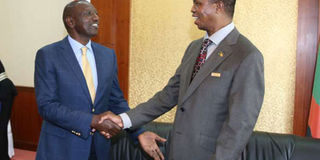Kenya obtains two-year moratorium on sugar imports from Comesa region

Deputy President William Ruto (left) and Zambia's President Edgar Lungu during the Common Market for Eastern and Southern Africa's 19th Summit of Heads of States and Governments in Antananarivo, Madagascar in October, 2016. PHOTO | DPPS
What you need to know:
The 19th Comesa Heads of State and Government Summit, which ended recently in Antananarivo, Madagascar, endorsed the decision of the Council of Ministers to extend the sugar safeguards for Kenya after the current moratorium ends in February next year.
Deputy President William Ruto, who represented President Uhuru Kenyatta at the summit, said it was evident that duty-free and quota-free trade in sugar within the Free Trade Area (FTA) would have had adverse implications for the rural farming communities in Kenya.
Kenya has obtained another two-year moratorium on sugar imports from the Common Market for Eastern and Southern Africa (Comesa) region, during which it is expected to turn around the fortunes of the local sugar industry.
The 19th Comesa Heads of State and Government Summit, which ended recently in Antananarivo, Madagascar, endorsed the decision of the Council of Ministers to extend the sugar safeguards for Kenya after the current moratorium ends in February next year.
Deputy President William Ruto, who represented President Uhuru Kenyatta at the summit, said it was evident that duty-free and quota-free trade in sugar within the Free Trade Area (FTA) would have had adverse implications for the rural farming communities in Kenya.
Mr Ruto, who lauded the decision by the summit, further said that, while Kenyans yearned for low-priced sugar from competitive industries in the Comesa region, this also meant that rural poverty would be exacerbated and concentrated in certain traditional sugar-growing parts of Kenya if the country was not given ample time to put the sector in order.
Said Mr Ruto: “Kenya is deeply grateful for the understanding and gracious accommodation extended by member states in this regard.
“I thank you all and pledge our commitment to ensure that the gesture is repaid with a complete transformative overhaul of Kenya’s sugar industry.”
Kenya’s sugar industry is struggling with various weaknesses along the entire value chain; as a result, wastage and production costs are high.
Mr Ruto pointed out that proliferation of sugar imports in the country would instigate severe economic shocks and a chain of disastrous socio-economic impacts, including increased malnutrition, HIV/Aids prevalence, susceptibility to treatable infections and severe unemployment.
“Kenya, therefore, desired a moratorium to put its house in order by undertaking measures to improve its sugar industry competitiveness, “ he said.
Mr Ruto was accompanied by Cabinet secretaries Amina Mohammed (Foreign Affairs) and Adan Mohammed (Trade) and Industrialisation Principal Secretary Chris Kiptoo. Narok Governor Samuel Kuntai also attended the summit.




